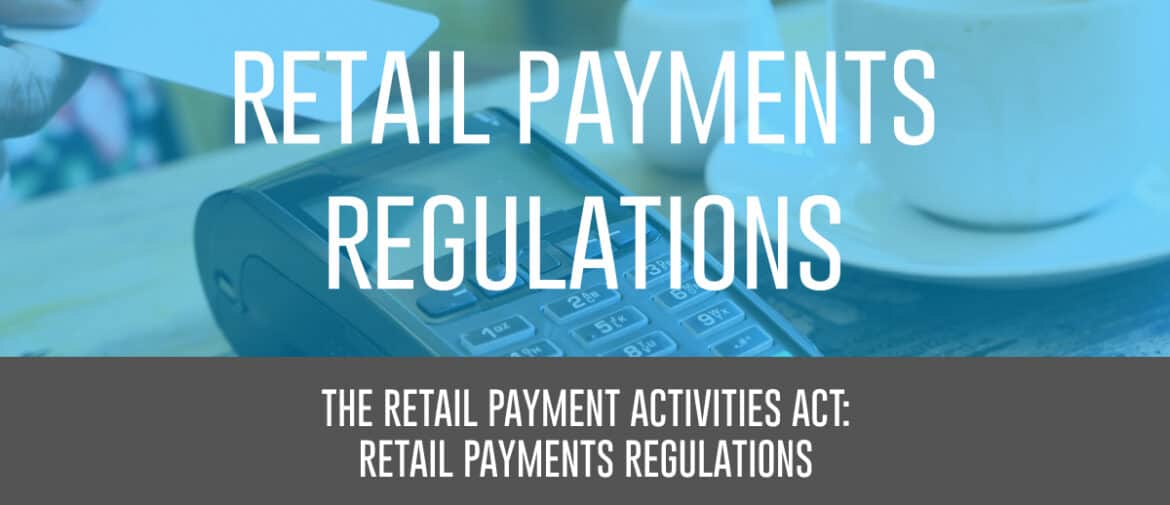On April 30, 2021, the federal government introduced An Act Respecting Retail Payment Activities also called the Retail Payment Activities Act (RPAA) as part of the Budget Implementation Bill (Bill C-30). The RPAA outlines the government’s commitment to regulate new and increasingly developing retail payment activities driven by innovative methods and technologies.
The RPAA will be the first regulatory regime for retail payment providers in Canada. The RPAA comes in response to a need for broader regulatory provisions focused on protecting consumers, fostering competition and promoting innovation in the digital payments sector.
What is a Retail Payment Activity and a Service Provider?
A retail payment activity is a payment function that is performed by a service provider, and provides an electronic transfer of funds between parties.
Consumers engage in retail payment activities on a regular basis whether it be shopping online, purchasing services or undertaking transfers.
A Payment Service Provider, also known as PSP, Payment Solution Provider, or Merchant Services Provider (MSP), is a financial entity that is authorized to process transactions between buyers and merchants.
A Payment Service Provider basically acts as a bridge or medium between the merchant, acquiring banks, and card networks involved in the transaction.
The subject of regulation under the RPAA is a retail payment activity performed by a PSP for an end user and is defined as a payment function that is performed in relation to a funds transfer that is made in Canadian currency, or another country currency, or using a unit that meets prescribed criteria.
Will the RPAA apply to you?
If you are a payment service provider, the RPAA applies to you if:
-
You are a PSP that performs any retail payment activities with a place of business in Canada
-
You are a PSP without a place of business in Canada, but you perform any retail payment activities for an end-user in Canada.
Under the RPAA, the Bank of Canada will regulate payment services performed by service providers and ensure mitigation of risk in the payment sector by monitoring these providers and their activities.
All prospective Payment Service Providers must be in compliance with the Act’s guidelines and a record of all registered entities will be generated and released by the Bank Of Canada.
The Bank will also provide a list of all the organizations that have been denied registration or whose membership has been revoked.
What are the requirements of the Act?
If you are a Service Provider and fall within the legislation of the RPAA, then you must comply with the requirements under the Act.
The requirements under the Act are:
-
Establish And Maintain an Operational Risk Management Framework: Effective mitigation of PSPs’ operational risk will be crucial to maintaining trust in any payment system that allows for PSP participation
-
Safeguard End-Users Funds: The PSP must hold funds in a designated trust account for the sole purpose of performing the retail payment activity. The PSP must also be insured.
-
Provide all relevant and necessary information to The Bank Of Canada: The organization must provide an annual report to the Bank of Canada that includes relevant information with respect to its risk management framework, and any account, insurance, or guarantee used to hold and safeguard end-user funds.
-
Register Under the Act and follow its provisions and requirement guidelines: Before commencing any payment activity, you must register with the Bank of Canada, submit an application using the prescribed form and pay a registration fee.
Are You Exempt From the RPAA?
There are some organizations and institutions that are exempt from registration. These are federally and provincially regulated institutions such as banks, foreign banks, credit unions, insurance and trust companies and loan companies and the organization payments Canada.
Additionally, certain payment structures are exempt from recognition by the RPAA. These include:
-
Systems designated as systemically important to the Payment Clearing and Settlement Act (for example, the Automated Clearing and Settlement System (ACSS) and Interac e-Transfer)
-
Cash withdrawals at an ATM.
-
Closed Loop gift cards and prepaid cards, provided they are issued by an organization that is excluded from the RPAA.
-
Those performed entirely between the PSP and entities it has an affiliation with.
The RPAA indicates that additional exclusions may be included in the regulations. These changes will be announced in the future.
Conclusion
The RPAA marks an important step forward in the regulation of PSPs and in broadening participation in Canada’s retail payments systems.
The regulation of retail payment activities is an essential step to mitigate risks in the retail payments arena and to enable membership eligibility for registered payment service providers.
The Act also provides enforcement abilities to the Bank of Canada, which may issue penalties against PSPs that are in violation.
Having regulated PSPs will enable greater competition and innovation in the Canadian payment sector and provide people more payment options to choose from with a greater sense of security.
If you have any questions regarding the above, please call us at (778) 565-4700 and one of our business lawyers will help guide you in the right direction.
The preceding content is for informational purposes only and does not constitute legal or professional advice. To obtain such advice, please contact our offices directly.

